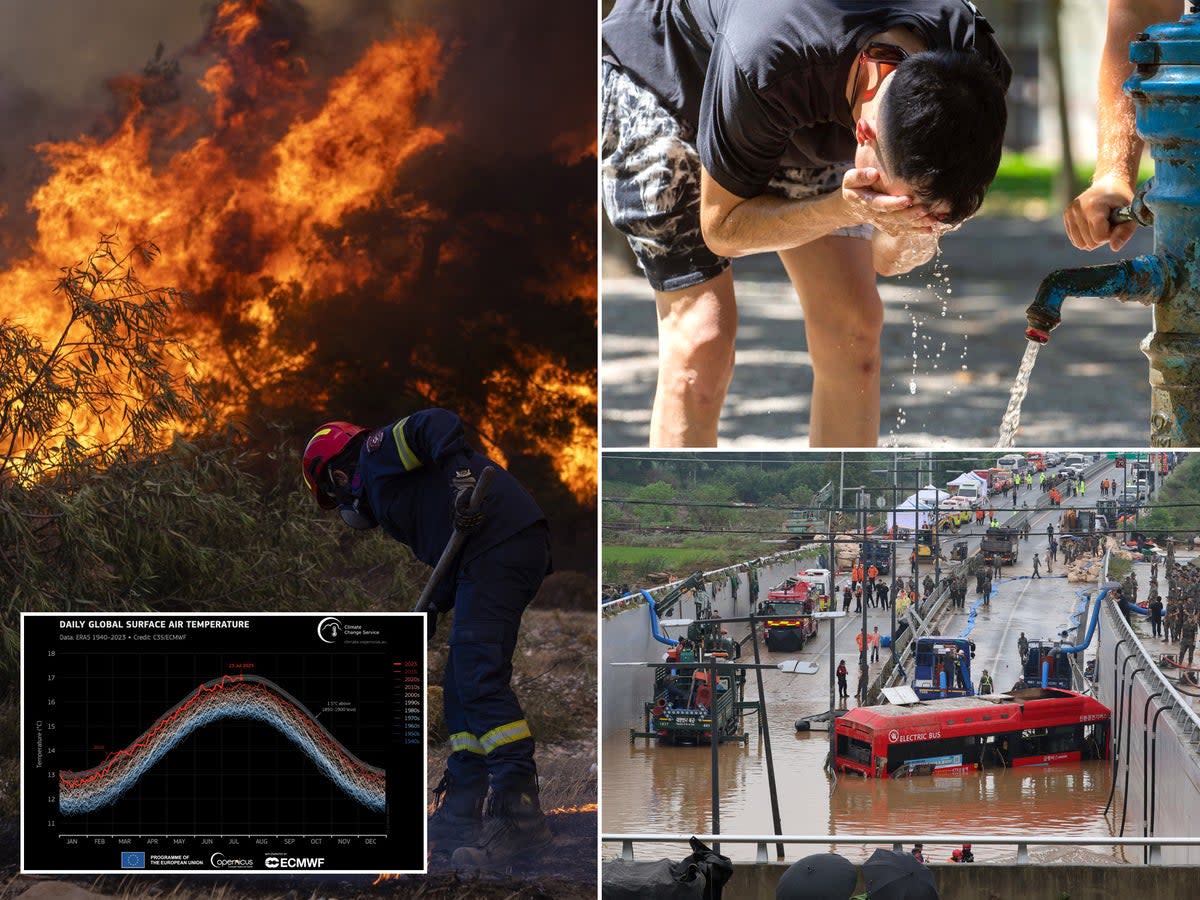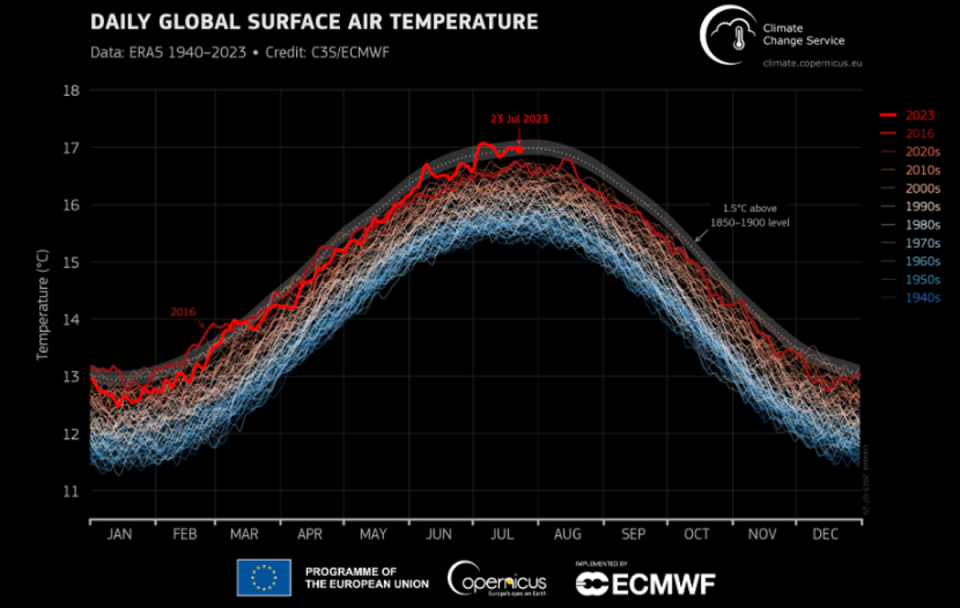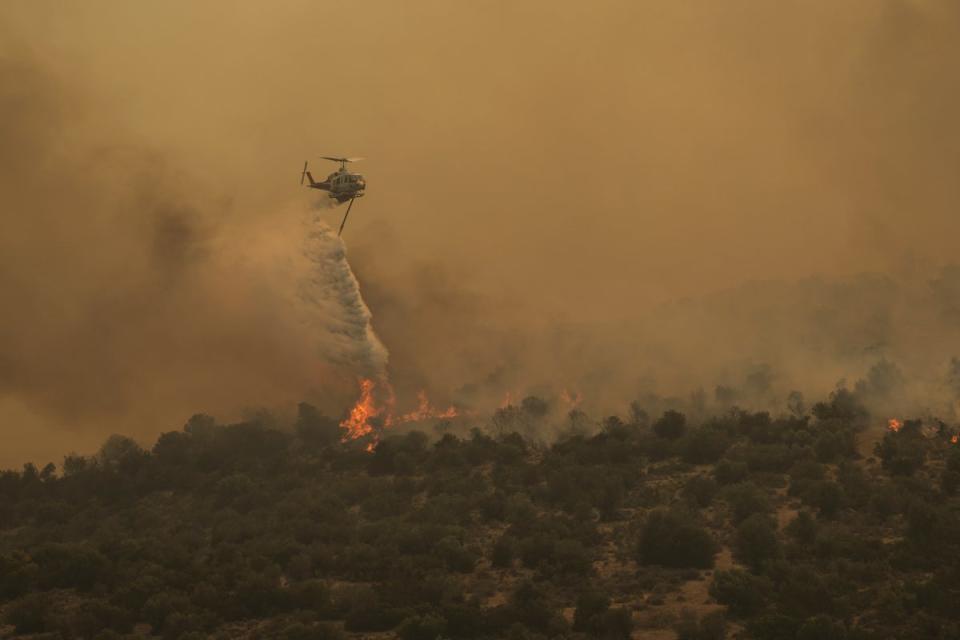World is entering ‘era of global boiling’, UN warns as July is the hottest month on record

- Oops!Something went wrong.Please try again later.
The warning lights have been on for weeks but now it is official: July 2023 is set to be the hottest month on record - and likely in 120,000 years.
The record-breaking average global mean temperature - the overall reading if you could stick a thermometer at every location on Earth - was confirmed by scientists at the European Copernicus Climate Change Service and World Meteorological Organization on Thursday, based on analysis of international climate and weather datasets.
“Climate change is here. It is terrifying. And it is just the beginning,” United Nations Secretary-General Antonio Guterres said on Thursday morning in New York.
“The era of global warming has ended; the era of global boiling has arrived.”
Dr Karsten Haustein, a climate scientist at Leipzig University whose separate analysis was first to confirm the new record, told a press briefing on Wednesday that July 2023 was also likely the warmest in 120,000 years, stretching back to the interglacial Eemian period when hardwood trees grew in the Arctic and hippos roamed as far north as the Rhine and Thames valleys.
It follows the hottest June on record, and toppling of the hottest day records, multiple times, in early July.
The overall mean temperature, which scientists say is around 17C (62.6F), isn’t going to kill anyone but it means that the planet has a “fever”, said Dr Frederike Otto, senior lecturer at the Grantham Institute for Climate Change.
@independent July 2023 is set to be the hottest month on record, and likely in 120,000 years. The record-breaking average global mean temperature, the overall reading if you could stick a thermometer at every location on Earth, was confirmed by scientists, including at the European Copernicus Climate Change Service and World Meteorological Organisation on Thursday, based on analysis of international climate and weather datasets. Senior climate correspondent Louise Boyle reports on the findings. #fypシ #fy #fyp #news #climate #world #heat #weather
♬ original sound - The Independent
The increase in global heat is manifesting in extreme weather events worldwide. Southern Europe, North Africa and Asia have faced relentless heatwaves since late spring, and in the southern United States, temperatures have regularly topped 100-degrees for weeks.
Phoenix, Arizona had a record-breaking 19 days in a row above 110F this month while China set a new national temperature record of 52.2C on 16 July in Xinjiang province.

Wildfires have exploded across Greece, Italy, Croatia and Algeria. In Canada, there are now more than 1,000 wildfires, doubling the amount four weeks ago, which have destroyed 46,000 square miles - an area half the size of the UK.
The extreme heat is also playing out in intense, erratic rainfall which has led to deadly flash flooding in China, South Korea, Brazil and US Northeast.
The 2023 July record also came with a public health warning.
Heatwaves are known as “silent killers” and are the deadliest of all climate-driven disasters. Extreme temperatures contributed to more than 60,000 deaths in Europe alone last year.
These deaths are most often among society’s already vulnerable groups, and an aging global population along with growing cities - which can be much hotter than rural places - means that “heat deaths will only increase,” Dr Otto said.

Dr Marina Romanello, a climate change and health researcher at UCL, said the record heat was “rapidly undermining the foundations of health” and placing more burdens on many countries’ already over-stretched healthcare systems.
Heat-related mortality for those over 65 years old has risen by about two-thirds in the past 20 years meanwhile, wildfire exposure has increased in 60 per cent of countries.
Almost a third of global land area is affected by drought annually compared to the 1950s, with the Horn of Africa and South America being particularly vulnerable. These conditions are pushing tens of millions more people into extreme hunger.
This year’s extreme heat is being amplified by the emergence of a natural climatic pattern, El Nino, which leads to hotter ocean temperatures. Since May, record sea surface temperatures have driven marine heatwaves in the Mediterranean, the UK and Ireland, the Baltic Sea, the Sea of Japan along with parts of the Pacific and western Indian Ocean.
But without a manmade climate crisis, “these heatwaves would be the statistical equivalent of impossible,” Dr Otto said.
The hottest month on record is a direct result of the burning and extraction of coal, oil and gas. We need to accelerate the clean energy transition to draw back from this runaway climate crisis.
Dr Catherine Abreu, executive director of Destination Zero
“This is not chance. These are not rare events in today’s climate.”
If El Nino intensifies, it’s possible that next summer will be even hotter.
In the first and third weeks of July, the planet shot 1.5-degrees (2.7F) above the average temperature 150 years ago - before humans began burning massive amounts of fossil fuels.
It doesn’t mean that the planet will permanently exceed 1.5C - the temperature limit set by the Paris Agreement which refers to long-term warming - but shows “we are close” and that 1.5C will likely be permanently breached in the early 2030s, Dr Haustein said.
The culprit of all this extreme heat are the excessive emissions from burning fossil fuels.
“We know who is responsible,” said Dr Catherine Abreu, executive director of Destination Zero, a diplomatic initiative focused on limiting fossil fuel production.
She pointed to a few dozen major players in oil, gas and coal, along with large cement-makers, adding that the fossil fuel industry has “known for decades” about the impacts their products would have on the planet.

“The hottest month on record is a direct result of the burning and extraction of coal, oil and gas,” she added. “We need to accelerate the clean energy transition to draw back from this runaway climate crisis.”
But even as scientists sound the alarm, again, political and corporate will to tackle the global crisis is lagging.
The global fossil fuel industry more than doubled their profits to $4 trillion in 2022 but little of this money has been used to transition away from oil and gas to clean energy.
At the geopolitical level, progress is grindingly slow. Last weekend’s meeting of energy ministers from the G20 - the world’s 20 richest countries - ended with failure to reach consensus on cutting down fossil fuels and a walk-back on commitments made in 2022.
Many governments are still prioritising, and subsidising, the oil and gas industry over healthcare, Dr Romanello said, and the global carbon price is still negative.
According to the 2022 Lancet Countdown report, led by Dr Romanello, in the majority of 86 countries creating the bulk of global emissions, the net cost of fossil fuel subsidies is $400bn. For one-third of these countries, their losses exceed what they spent on healthcare.
The new July record raises the prospect that 2023 could be the hottest year in human history, a record that is unlikely to hold for long.
“The extreme weather which has affected many millions of people in July is unfortunately the harsh reality of climate change and a foretaste of the future,” said WMO’s Secretary-General Prof. Petteri Taalas.
“The need to reduce greenhouse gas emissions is more urgent than ever before. Climate action is not a luxury but a must.”

